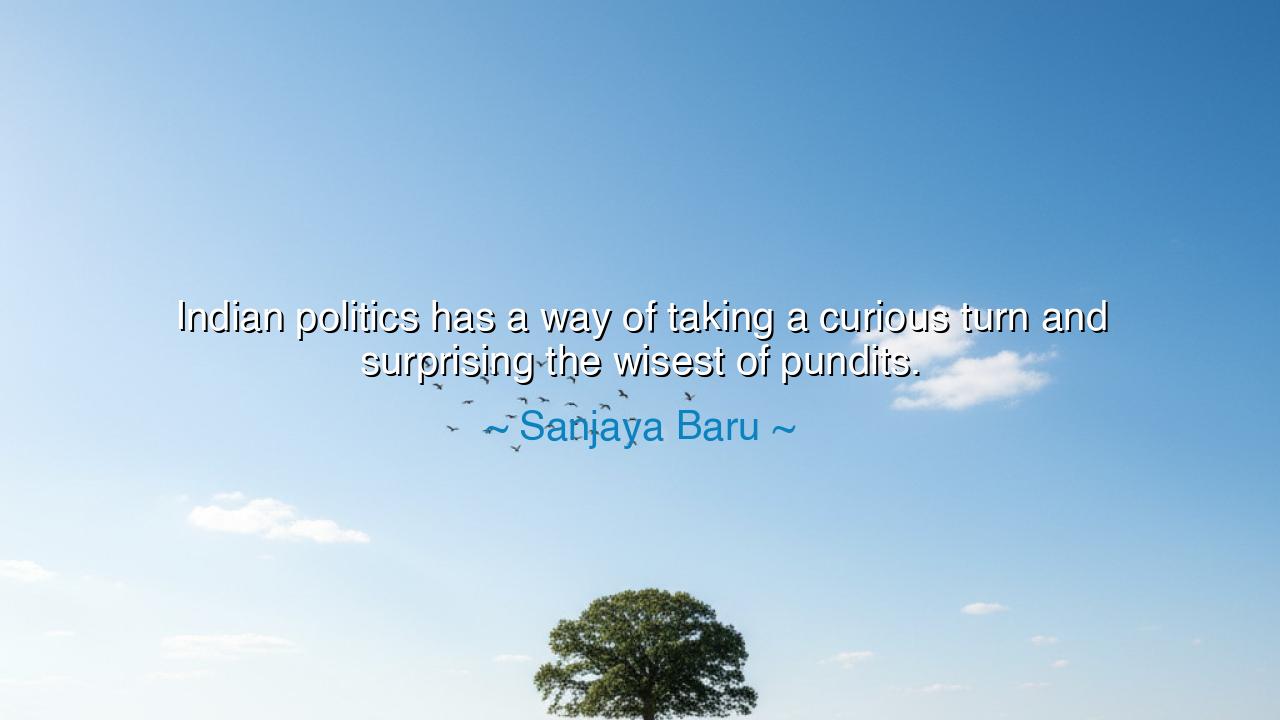
Indian politics has a way of taking a curious turn and
Indian politics has a way of taking a curious turn and surprising the wisest of pundits.






O Seekers of Wisdom, hear the words of Sanjaya Baru, who speaks of the unpredictable and often bewildering nature of Indian politics: "Indian politics has a way of taking a curious turn and surprising the wisest of pundits." In these words, Baru captures the essence of a political system that is as vast and diverse as the land it governs. India, with its many languages, cultures, and ideologies, is a land where the course of political events often defies even the most carefully laid plans and predictions. Wisdom in this realm is not found in the certainty of forecasts but in the ability to adapt to the ever-changing tides of politics.
Consider, O Children, that Indian politics is a dynamic force, shaped by the complexities of regional power, caste, religion, and economic disparity. It is a land where alliances shift like the desert winds, where the balance of power can change with the rise of a single leader, and where the unexpected is not just possible, but inevitable. The pundits, those who pride themselves on their understanding of the game, can often be left in awe of the sudden turns that politics takes. Here, certainty is an illusion, and the future is shaped by the most unlikely events and actors.
Look to the example of the 1991 Indian economic crisis, when India was on the brink of financial collapse. The political system was in turmoil, with Prime Minister V.P. Singh leading a fragile coalition, and the nation was facing mounting debt and dwindling foreign reserves. Yet, it was not a mainstream politician who took charge of the reforms but Manmohan Singh, the finance minister, who, under the leadership of P.V. Narasimha Rao, defied conventional political wisdom to implement radical economic reforms. This unexpected turn of events reshaped India’s economy and catapulted the nation into the global market. It was a surprising shift in Indian politics that even the most seasoned pundits did not foresee.
And so, O Seekers, let us understand the profound lesson in Baru's words: Indian politics is not for the faint of heart or those who seek predictability. The true wisdom in such a land lies not in the ability to predict the future but in the strength to adapt, the courage to seize unexpected opportunities, and the patience to wait for the right moment. Indian politics, with its rich history and complex fabric, teaches us that nothing is set in stone, and those who navigate it must remain both humble and alert, always prepared for the surprises that lie ahead.
Let us, therefore, approach the political world with awareness, knowing that in the dance of Indian politics, the unexpected is the rule, not the exception. As Baru suggests, even the wisest must remain open to the mysteries of the future, for the true lesson of politics is not in predicting its path, but in understanding the forces that shape it. To walk in such a world is to be forever learning, forever adapting, and forever amazed by the ever-changing dance of power, influence, and uncertainty.






TG11A3-08- Ta The Gioi
There’s a civic angle to being surprised: it can either humble analysts or deepen public cynicism about expertise. What accountability should apply when high-confidence calls miss badly—scorecards, postmortems, or a requirement to publish what would have falsified the thesis? As a news consumer, how do I protect myself from confident but brittle takes? I want practical heuristics: diversify sources across languages and regions, separate descriptive reporting from projection, and favor analysts who revise in public. Any recommendations for trackers that log predictions against outcomes?
GHMa Gia Huy
Media language—“wave,” “anti-incumbency,” “silent voter”—feels like shorthand that sometimes explains everything and nothing. Are these terms empirically grounded or narrative glue we reach for when data are messy? I’d rather see more ward-level splits, booth-wise turnout deltas, and candidate replacement effects documented openly. Also, how should we account for policy announcements that land unevenly across states? I’m asking for a reader’s guide: a short checklist to evaluate claims on air—sample size, seat-level modeling, alliance assumptions, and whether the forecast distinguishes preference from probability.
DBPhan Duc Binh
Polls here sometimes capture vote share but stumble on seat conversion and late shifts. How much of that is sampling bias versus last-mile mobilization—booth management, WhatsApp cascades, and turnout operations that activate in the final 72 hours? I’d like to know which indicators deserve more weight: third-front candidate withdrawals, micro-alliances, rain on polling day, or celebrity rallies that alter media oxygen. Could we maintain a live dashboard tracking these variables and back-testing their predictive value across multiple cycles, instead of leaning on vibes?
LHTuyet Luc Hy
As a reader, I’m struck by how frequently expert narratives collide with the layered reality of coalition arithmetic, regional parties, caste configurations, and state-specific issues. National mood pieces often miss district-level cross-pressures or hyperlocal grievances that swing margins. Is there a better way to model this complexity—perhaps a Bayesian ensemble that blends polling, candidate quality, alliance durability, turnout history, and issue salience? I’d love a transparent “assumption ledger” for any forecast: list priors, weights, and triggers that would force an update when ground signals contradict studio certainties.